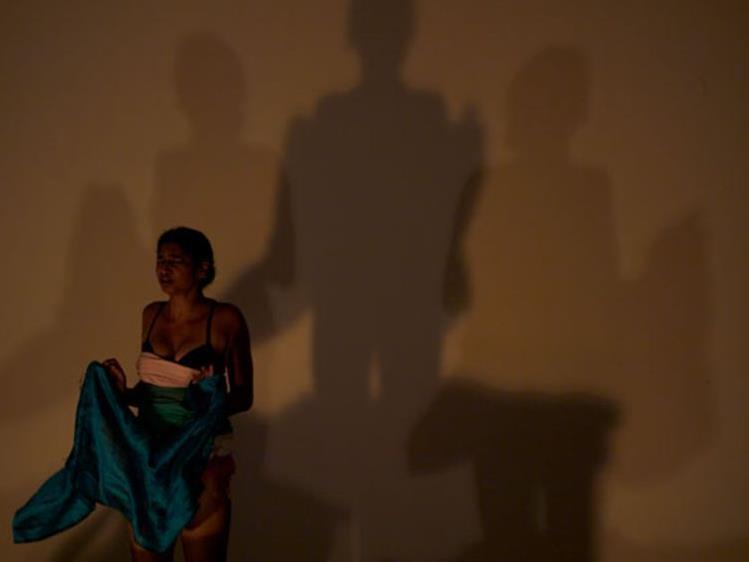Image: Mallika Taneja
Wesley Enoch is uncomfortable with the very idea of ‘political artists’. To the Sydney Festival Artistic Director, who recently chaired a panel on the subject at the International Society for the Performing Arts, the idea that some artists are political and others are uncontroversial is a complete misunderstanding of what artists do.
Just making art
‘The idea that there’s anything like art that is apolitical is almost a nonsense in this world, a world where, I believe, if you are not deconstructing the status quo you are in the process of constructing it,’ said Enoch.
‘All artists are in the process of defining the future, defining the world, defining what needs to happen.’
An Indigenous artist whose work includes explorations of Aboriginal history such as Black Diggers and reimaginings of classics in an Indigenous context, Enoch objects to artists who deal with certain topics being labelled as ‘political artists’.
‘Why are we being defined as protestors, as activists, as provocateurs? Why are we not seen as artists who continue a constant discussion about change? If you believe that artists are canaries down the mineshaft, that we are in some respects the voices on the crest of the wave of the changes that happen in society, why are we seen as The Other?’ he asked.
Truth-telling
Penny Arcade is performance artist who is constantly described in media coverage as ‘controversial’. Her interest in sexuality and censorship, most notably in the memorably- named show Bitch! Dyke! Faghag! Whore! has been credited with a major role in the gay shame movement, her early association with Andy Warhol and her whimsical name all suggest her counter culture associations.
But contrary to the headlines, she does not see herself as a provocateur.
‘I wouldn’t consider myself a provocative person at all. I consider myself someone who has a rigorous inquiry and that I am a parrhesta, which is a Greek word. In Athenian society the parrhesta was the truth –teller and had three very specific elements.. . One, you are telling the truth from your point of view Two, there is loss involved…in Athenian times if you were really telling truth to power you would lose your life. In my life I am marginalized, I am represented as a rabble-rouser and a trouble-maker . And then the third part of being a parrhesta is that you are telling your truth out of a sense of duty, obligation and contribution, which is very hard for people to wrap their head around that. ‘
She believes theatre has an important role in truth-telling, but it’s not about a trendy kind political art which she decries as ‘shockism’.
‘We are living in a time when almost nothing important is discussed on television or in films so theatre is one of the last places where people come and people go to the theatrre to experience that which we are unable or unwilling to experience in real life.
‘I don’t believe in shock in the theatre. I believe that the provocative gesture is something that the artists bring to the theatre that goes home with the audience. Not that you are ambushed in the theatre but something that ,lodges within you within the theatre that when you go home it gives you this context, this way to think about where you are in this moment, you and this society.’
Speaking up
Playwright, filmmaker, musician and prominent Aboriginal spokesman Richard Frankland sees politics as the inevitable and necessary consequence of the voice that art gives the artist.
‘When you’ve got art you’ve got voice and with voice comes freedom and with freedom comes responsibility and in Australia we haven’t been that responsible with our freedom, we haven’t been that responsible with our art,’ he said.
‘To me art is about instigating thought, it’s about challenging others and much more it’s about challenging myself. Challenge the inner racist, then go to the workplace and challenge the racist there and use art to do it. The go to your family and do exactly the same. And when you can’t find a racist in yourself, in your family, or amongst your colleagues or in the streets of Australia then turn around and use art to challenge another inequity in society. ‘
He said not to use the political power of art is negligent when there are such great inequities in our society.
‘What fools are we to not use art as a way to instigate great change and change the cultural tapestry of a nation? The role of art is to create a new national identity. It’s about creating a pathway to create a nation that we can all call home and look at each other as equal men and women.
The way artists live
Indian theatremaker Mallika Taneja is not welcome in many theatres in her home country. In a society with strong strictures on how women should dress, Taneja rocks the boat by starting her show In her skin wearing nothing at all.
Then she begins layering on item after item of clothing all the while giving a monologue in the guise of a young girl concerned that she dress in a way that will not attract the wrong kind of attention. The work addresses the blaming of women for rape based on what they wear.
Taneja sees protest and activism as an essential to the way she works not just in the work she makes.
‘Since I don’t have formal venues that will take me or it’s honestly just too much of a hassle to get them to take me…so what are you going to do? That’s where you reimagine. I have gone around asking people for living rooms to do a show and that’s part of the re-imaginging.
‘ A lot of us are going to wards reimaging how we perform, where we perform, who we perform for and this is how I feel change starts. This is also part of our job to realise ourselves.’





